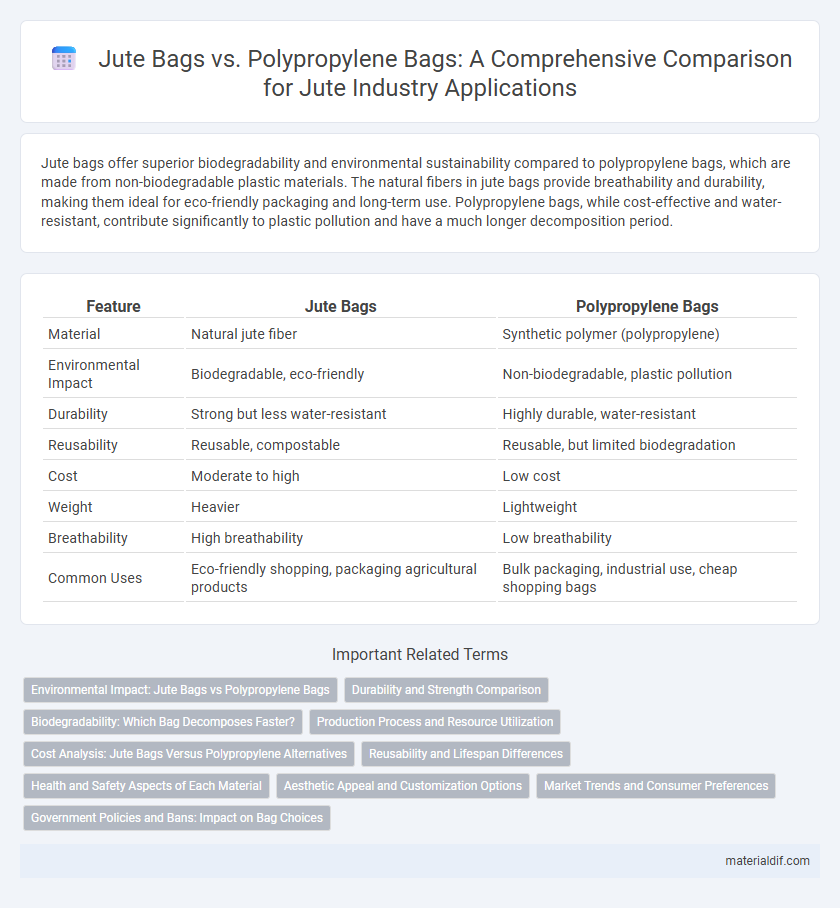Jute bags offer superior biodegradability and environmental sustainability compared to polypropylene bags, which are made from non-biodegradable plastic materials. The natural fibers in jute bags provide breathability and durability, making them ideal for eco-friendly packaging and long-term use. Polypropylene bags, while cost-effective and water-resistant, contribute significantly to plastic pollution and have a much longer decomposition period.
Table of Comparison
| Feature | Jute Bags | Polypropylene Bags |
|---|---|---|
| Material | Natural jute fiber | Synthetic polymer (polypropylene) |
| Environmental Impact | Biodegradable, eco-friendly | Non-biodegradable, plastic pollution |
| Durability | Strong but less water-resistant | Highly durable, water-resistant |
| Reusability | Reusable, compostable | Reusable, but limited biodegradation |
| Cost | Moderate to high | Low cost |
| Weight | Heavier | Lightweight |
| Breathability | High breathability | Low breathability |
| Common Uses | Eco-friendly shopping, packaging agricultural products | Bulk packaging, industrial use, cheap shopping bags |
Environmental Impact: Jute Bags vs Polypropylene Bags
Jute bags are biodegradable and compostable, significantly reducing environmental pollution compared to polypropylene bags, which are made from non-renewable petroleum-based plastics and can take hundreds of years to decompose. The production of jute bags consumes less energy, generates fewer greenhouse gas emissions, and supports sustainable agriculture, while polypropylene bags contribute to microplastic pollution and landfill overflow. Choosing jute bags promotes eco-friendly waste management and lowers carbon footprints, making them a more sustainable alternative to polypropylene options.
Durability and Strength Comparison
Jute bags offer natural durability with strong fiber composition, making them resistant to wear and tear in moderate usage, though less robust in heavy-duty conditions compared to polypropylene bags. Polypropylene bags provide superior tensile strength and resistance to moisture, ensuring longer lifespan in industrial and agricultural applications. The biodegradability of jute contrasts with the synthetic resilience of polypropylene, influencing durability based on environmental exposure and usage intensity.
Biodegradability: Which Bag Decomposes Faster?
Jute bags decompose significantly faster than polypropylene bags due to their natural plant fiber composition, breaking down completely within 1 to 2 years under composting conditions. Polypropylene bags, made from synthetic polymers, can persist in the environment for up to 500 years, contributing to plastic pollution. The biodegradability of jute makes it a more sustainable choice for reducing environmental impact and promoting eco-friendly waste management.
Production Process and Resource Utilization
Jute bags are made from natural plant fibers through a process involving retting, stripping, and spinning, which requires less energy and uses renewable resources. Polypropylene bags are manufactured from synthetic polymers derived from petroleum, involving energy-intensive processes like polymerization and extrusion. Resource utilization for jute bags is more sustainable due to biodegradability and lower carbon emissions, whereas polypropylene bags rely on non-renewable fossil fuels and contribute to plastic pollution.
Cost Analysis: Jute Bags Versus Polypropylene Alternatives
Jute bags generally have a higher upfront cost compared to polypropylene bags due to the natural fiber processing and eco-friendly production methods involved. Polypropylene bags are cheaper to manufacture and widely available, making them cost-effective for large-scale use but often lack durability and environmental benefits. Long-term cost analysis favors jute bags as they are biodegradable, reusable, and reduce disposal expenses, aligning with sustainable business goals despite the initial investment.
Reusability and Lifespan Differences
Jute bags offer superior reusability due to their natural fiber strength and biodegradability, making them suitable for multiple uses over an extended lifespan that can exceed five years with proper care. Polypropylene bags, although durable and water-resistant, typically have a shorter lifespan and tend to degrade faster under UV exposure, limiting their reusability to around one to two years. The sustainable nature of jute bags supports environmental benefits by reducing plastic waste, whereas polypropylene bags contribute more to pollution despite their temporary durability.
Health and Safety Aspects of Each Material
Jute bags are biodegradable and free from harmful chemicals, reducing risks of skin irritation and respiratory issues often associated with synthetic fibers. Polypropylene bags may release microplastics and toxic compounds during production and disposal, posing health hazards to workers and the environment. Choosing jute bags supports safer handling and reduces long-term health and environmental impacts linked to plastic pollution.
Aesthetic Appeal and Customization Options
Jute bags offer a natural, rustic aesthetic that appeals to eco-conscious consumers seeking organic textures and earthy tones, making them ideal for artisanal branding. These bags provide versatile customization options such as eco-friendly screen printing, embroidery, and natural dyeing, enhancing visual appeal without compromising sustainability. In contrast, polypropylene bags are often limited to bright, synthetic colors and printed logos that prioritize cost-efficiency over artisanal charm and tactile quality.
Market Trends and Consumer Preferences
Jute bags, made from natural fibers, are gaining traction in the market due to increasing consumer demand for sustainable and biodegradable packaging solutions, contrasting with polypropylene bags that are favored for durability and lower cost. Market trends indicate a shift towards eco-friendly products driven by regulatory policies and consumer awareness, pushing retailers to prefer jute bags despite higher prices. Consumer preferences are evolving, showcasing a willingness to invest in environmentally responsible alternatives, positioning jute bags as a prominent choice in green packaging markets.
Government Policies and Bans: Impact on Bag Choices
Government policies favoring sustainable materials have led to increased restrictions and bans on polypropylene bags, encouraging the adoption of eco-friendly jute bags. Regulatory measures, such as plastic bag levies and outright bans in India and Bangladesh, significantly influence market demand toward biodegradable alternatives like jute. These policy shifts underscore a growing governmental commitment to reducing plastic pollution through the promotion of renewable, compostable bag options.
Jute Bags vs Polypropylene Bags Infographic

 materialdif.com
materialdif.com